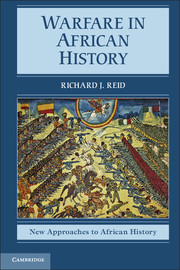Book contents
- Frontmatter
- Contents
- Maps
- Preface
- Acknowledgements
- List of maps
- Chapter 1 The Contours of Violence
- Chapter 2 Arms in Africa’s Antiquity
- Chapter 3 The Military Foundations of State and Society, to circa 1600
- Chapter 4 Destruction and Construction, circa 1600 to circa 1800
- Chapter 5 Transformations in Violence
- Chapter 6 Revolutions Incomplete
- Index
- References
Chapter 6 - Revolutions Incomplete
The Old and the New in the Modern Era
Published online by Cambridge University Press: 05 June 2012
- Frontmatter
- Contents
- Maps
- Preface
- Acknowledgements
- List of maps
- Chapter 1 The Contours of Violence
- Chapter 2 Arms in Africa’s Antiquity
- Chapter 3 The Military Foundations of State and Society, to circa 1600
- Chapter 4 Destruction and Construction, circa 1600 to circa 1800
- Chapter 5 Transformations in Violence
- Chapter 6 Revolutions Incomplete
- Index
- References
Summary
Africa has experienced dramatic – and traumatic – change in terms of warfare and military organisation in the last century. Yet the twentieth century has witnessed, in many respects, a continuation of the nineteenth-century revolution in military culture and the practice of war, with a number of novel elements, and that there is little in the continent’s recent history which cannot be better understood by examining its deeper past. In many ways, of course, the period between c. 1880 and c. 1920 witnessed a hijacking of the nineteenth-century revolution. The colonial era, as is well attested, involved a retardation of Africa’s economic development in a number of respects; it was also to some extent a period of military underdevelopment, distorting an essential part of the continent’s socio-economic and political evolution over the long term with dire implications for Africa’s subsequent development. However, this is too easily exaggerated, and a modern historiographical obsession with the colonial impact has frequently obscured long-term patterns. In many respects, in fact, the colonial era represented the co-option of European imperial impulses into extant African processes. The supposed accoutrements of modernity – what would become the nation-state and its Berlin Congress–era boundaries – are either irrelevant or have only created new spaces within which ‘pre-colonial’ conflict can be played out, with new material and ideological equipment. Even within colonial structures, African military innovation is evident, for example. The most damaging colonial legacy, indeed, is not the artificiality of the African nation-state; rather, it is the enduring concept, although it now goes by different aliases, of the pax colonia, namely the crystallisation of the notion that there was and is no place for habitually ‘warring tribes’ in the non-European world, a world which was now prised open to inexorable modernity. It was then, and continues to be, received wisdom that such violence was inimical to ‘development’, but it was believed in equal measure that it could be diagnosed and that it was ultimately ‘curable’.
- Type
- Chapter
- Information
- Warfare in African History , pp. 147 - 182Publisher: Cambridge University PressPrint publication year: 2012



